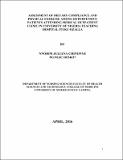Abstract:
The management of hypertension is tripartite in nature: medication, physical exercise and dietary modification. While medication is curative, physical exercise and dietary modification are both preventive and curative. Dietary and lifestyle changes can improve blood pressure control and decrease the risk of health complications, although treatment with medication is still often necessary in people for whom lifestyle changes are not enough. Physical exercise regimes which are shown to reduce blood pressure include isometric resistance exercises, aerobic exercise, resistance exercise etc. However, substantial literature and research have shown that hypertensive patients rarely comply with these lifestyle changes with the resultant effect that even the medication does not seem to have effect in the long run. Hence the purpose of the study is to assess compliance with dietary modification and physical exercise among hypertensive patients attending Medical Out-Patient Clinic in UNTH. The objectives were to: identify dietary practices adopted by hypertensive patients in the study area; determine the extent of compliance with dietary modification among hypertensive patients that attend UNTH Medical Outpatient Clinic; determine the extent of compliance with physical exercises among hypertensive patients in UNTH, and establish the relationship between demographic factors and compliance to modifications in dietary practices and physical exercise activities. A cross-sectional descriptive survey research design was employed and a sample of 240 hypertensive patients was drawn from patients attending Out Patient Clinic in UNTH. Descriptive statistics and Chi-square statistical test were used for data analyses. Findings revealed that 56(23.3%), 142(59.20%) and 65(27.08%) of respondents complied with dietary modification, dietary practices and physical exercises activities respectively. The study concluded that there was poor compliance to dietary modification, and physical exercises among the study population. It is therefore recommended that health care providers should intensify health education on the need for dietary compliance and physical exercises as primary strategies to control blood pressure and reduce the risk of cardiovascular problems.
